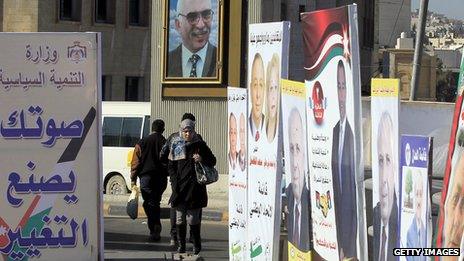Jordan election: Risks of not changing
- Published

King Abdullah of Jordan has promised that parliamentary elections will see a popularly-elected prime minister take office for the first time.
It has been the chief demand of demonstrators since the start of Arab Spring protests two years ago.
But voters say they are disillusioned. Despite reforms, voters do not expect to see fresh faces and real political change, and rumours of vote-buying still abound.
The king says he will for the first time consult parliament over the choice of the next prime minister, rather than making the appointment by royal decree.
Some proportional representation has been introduced into the voting system and an independent electoral commission has been set up.
The country's biggest opposition - the Muslim Brotherhood movement - and other political activists are boycotting the vote, touted as the centrepiece of the palace-led reform initiatives. Their boycott undermines the broad-based political involvement the monarch had hoped for.
Can the king's gamble to effect change from the throne work or will Jordan begin to witness bigger and most sustained street protests?
Revamp and risks
Jordanian political analyst Osama al-Sharif believes the palace has "placed all bets on elections as the culmination of two years of political work", which includes revamping the constitution and setting up a constitutional court.
While the initiatives should herald "a new start for a vibrant political process in Jordan," he warned that the reforms "do not meet the standards" for the promised political transformation.
In fact, Mr Sharif argues the new election law seems to have encouraged "mediocre representatives to run for office".
Jordan expert Sean Yom, a professor at Temple University in Philadelphia, views the elections as a "dividing line", either permitting the status quo to continue or ushering in fresh, sustained protests.
"If various opposition forces do not see the elections as credible, and the monarchy still insists on forming a parliament and a government after the elections, that's when I think you will see a real sign of instability and a movement towards political disorder in Jordan," he warned.
Economic problems
Demonstrations here began after the revolution in Tunisia, but before Egypt's President Mubarak was toppled in 2011. Initially calling for more jobs and an end to government corruption, protesters also began demanding more political say and for some of the king's absolute powers to be reduced.
While protests have been largely peaceful, nationwide demonstrations last November turned violent, drawing ordinary citizens to the streets, after prices were increased on petrol, heating and other fuels.
There were also some unprecedented calls for King Abdullah to step down. But the Hashemite kingdom, a staunch US ally and peace partner with Israel, has so far been spared the unrest that has seen long-time Arab rulers toppled.
At the same time, Jordan is facing an acute financial crisis that has forced it to seek a $2bn loan from the International Monetary Fund (IMF). Employment is running high and the resource-poor country is as reliant as ever on Western and Gulf Arab aid.
Mr Sharif says the palace believes "if you solve Jordan's economic problems, then the political problems will die down."
'Critical dialogue'
However, Julian Barnes-Dacey of the European Council on Foreign Relations sees renewed tests for Jordan's stability.
Faced with elections that "all but ensure that the makeup of the new parliament will be virtually the same as the current body", he said the legislature will be "neither representative nor empowered to advance meaningful reform, let alone deal with the pressing economic challenges".
Given the IMF-mandated prices increases, he believes a "very real prospect of widening discontent" exists, particularly given on going regional uncertainties.
For many Jordanians, the Hashemite monarchy has been a guarantor of stability in a volatile neighbourhood. It has so far balanced the interests of powerful Bedouin tribes, long a bulwark of support for the king, with those of the majority of Jordan's citizens who are of Palestinian origin.
While the US and Israel are both backing the palace-initiated reforms despite what some analysts see as a lack of substantial progress, Mr Barnes-Dacey said Europe should pursue a different course.
He proposes a "more critical dialogue in private" given the moderate tone of Jordan's opposition and the deep legitimacy of the Hashemite system as one way of averting potential instability in the months ahead.
- Published22 January 2013
- Published16 November 2012
- Published19 April 2023
- Published16 November 2012
- Published15 November 2012
- Published14 November 2012